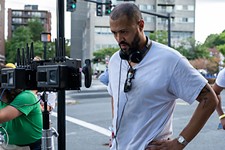AGUIRRE: THE WRATH OF GOD
D: Werner Herzog; with Klaus Kinski, Ruy Guerra, Del Negro, Helena Rogjo, Cecilia Rivera, Peter Berling. Klaus Kinski's manic, at times almost homicidal creativity (documented in Herzog's film
My Best Fiend), his unshakeable conviction that art and life are interchangeable and should therefore be hybridized into a cohesive whole as often and as dramatically as possible, and his outlandish public persona are all the stuff of legend. It's his role in this 1972 Herzog film upon which much of the late actor's bizarre mythos spins. Set in 1560, the film follows Spanish conquistador Gonzalo Pizarro, his men, and a 100 or so Indian slaves. Pizarro's foot soldier, Aguirre (Kinski), leads the group to search in vain for El Dorado, the fabled city of gold believed to lie somewhere in the Peruvian rainforest, and slowly goes mad in the process. From the vertiginous opening shot of the armor-clad conquistadors descending a near-vertical mountain face to the final images of Kinski's Aguirre -- the man who would be god -- besieged by corpses and monkeys as he drifts, utterly alone on his raft, down the muddy Amazon, this is Herzog and Kinski's most awesome achievement in a tandem career filled with astonishing moments. There has never been another film even remotely like
Aguirre -- the only film to come within striking distance was Herzog's
Fitzcarraldo, this film's thematic sibling -- and it could never even be conceived of today. Rumors persist of Herzog himself enslaving the indigenous Peruvian population to serve the will of the film, and of Kinski's mad tantrums and perpetual threats to abandon the project midcourse. (Herzog held up a gun at one point and told the actor he'd shoot him if he left, and then turn the pistol on himself; perhaps understandably, Kinski chose to finish the film.) In the end, though, the film is such a remarkable achievement -- an absolute and pure expression of the director's vision made up of phenomenal images coupled to only sporadic dialogue and a haunting, eerie electronic score by Popol Vuh's (recently deceased) Florian Fricke -- that the "legend" is rendered less interesting than the film itself. It's an impossible, epic vision of death and despair and hideous beauty in a faraway place, and one of the most visceral depictions of self-manufactured doom ever seen.











